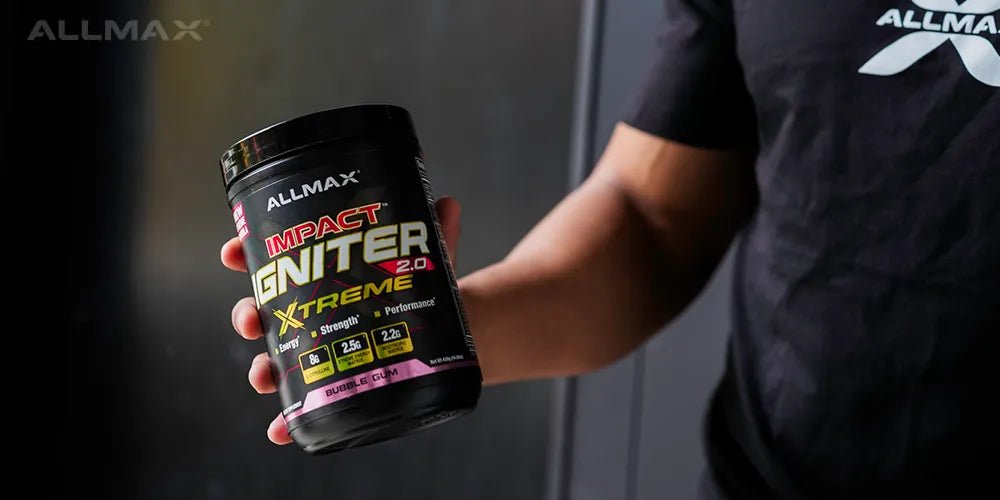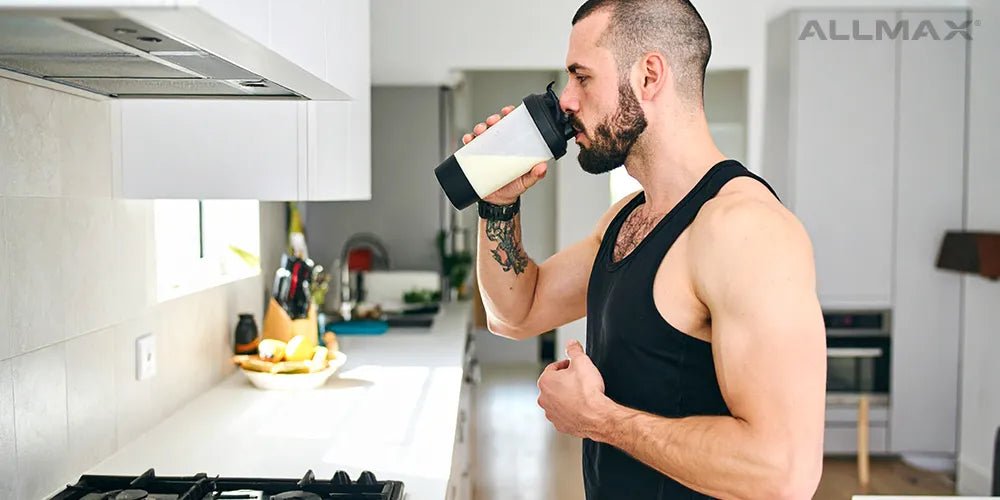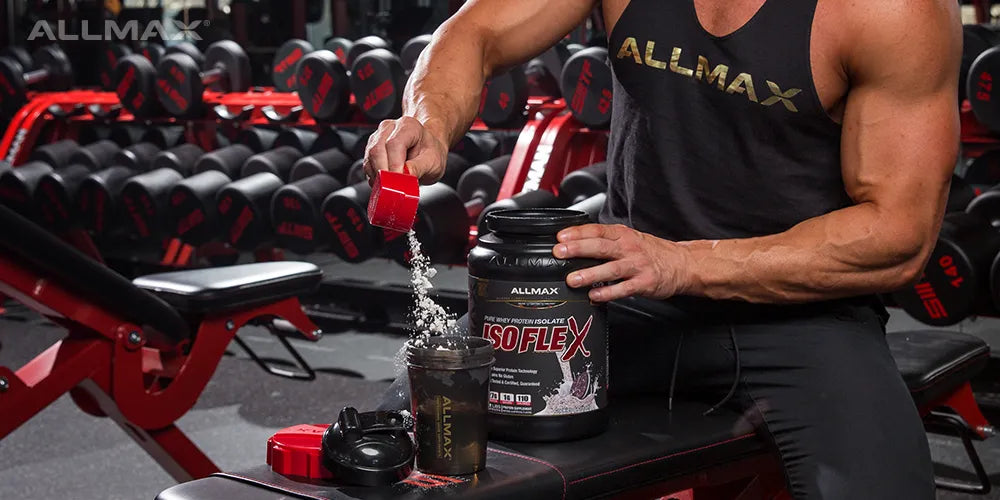Building muscle requires more than just hard work in the gym: it starts with what you put on your plate. Choosing the right foods can accelerate muscle growth, improve recovery, and help you gain lean mass more efficiently.
In this article, we’ll explore the 7 best muscle-building foods that should be part of your diet to maximize your gains and reach your fitness goals faster.
It is impossible to gain mass and get lean at the same time. Building mass depends largely on the amount of food you eat, the frequency of eating, and your level of effort when lifting.
You've gotta eat big to get big, and choosing the correct foods to eat is critical to mass-building success.
Eating more calories doesn't mean eating junk food. You should focus on clean eating and high-quality supplements.
The 7 foods on our list go beyond the standards most bodybuilders have when it comes to the best foods for building muscle
Allmax has a comprehensive line up of high-protein supplements that are optimally suited to help you gain mass.
#1 – Whole Milk

Whole milk is a powerhouse when it comes to gaining mass. Just one glass delivers a dense dose of easily absorbed calories, making it perfect for anyone looking to add size. It’s naturally rich in both casein and whey proteins, giving you a sustained release of amino acids to fuel muscle repair and growth.
Here’s what makes whole milk such a valuable muscle-building food:
High in complete protein – contains both casein (slow-digesting) and whey (fast-absorbing)
Packed with key electrolytes – magnesium, potassium, and calcium to support muscle function and hydration
Loaded with essential vitamins – including A, B, and D for hormone balance and immune support
Contains healthy fats – which help increase natural testosterone levels for better mass gains
Despite its benefits, whole milk has lost popularity in favor of low-fat options and protein powders. But it remains a complete, natural recovery drink that bodybuilders used to swear by.
Pro tip: Supercharge your next protein shake by mixing it with whole milk for extra calories, creaminess, and anabolic impact.
Bonus tip: Chocolate milk makes a fantastic post-workout treat. Its combination of fast carbs and protein helps replenish glycogen and kick-start muscle recovery. Add 30g of high-quality whey for even better results.
We suggest mixing one scoop of ISOFLEX pure whey isolate with one scoop of CASEIN-FX , pure micellar casein, to get a similar protein profile to that of milk, but without the added fat and sugars. This mixture will provide you an optimal combination of fast and slow-digesting proteins (52 grams!) that tastes absolutely delicious.
#2 - Quinoa

Quinoa is a highly nutritious grain native to South America and widely considered one of the world’s healthiest foods. It delivers approximately 14 grams of complete protein per 100 grams , providing all nine essential amino acids—something rare in plant-based sources. It’s also high in complex carbohydrates and dietary fiber , making it a powerful fuel for training.
Nutritionally, quinoa offers key micronutrients that support muscle function and overall health:
Vitamin B6 – supports protein metabolism (25% of daily value per serving)
Magnesium – vital for muscle contraction and recovery (49% DV)
Iron – helps deliver oxygen to working muscles (25% DV)
Naturally gluten-free and easy to digest
Thanks to its versatility, quinoa is ideal as a base for savory dishes, bowls, or warm salads. For best results, substitute it in place of 1–2 rice-based meals per day to increase nutritional density without sacrificing carbs.
Note: While quinoa is an excellent everyday carb, it's not ideal as a post-workout carbohydrate source . Because it digests more slowly, it doesn't rapidly spike insulin or replenish glycogen stores. After training, faster-digesting carbs are more effective for kickstarting recovery and supporting muscle growth.
CARBION from Allmax is scientifically engineered for mega-rapid and complete absorption, so that muscle repair, recuperation and hypertrophy can begin within minutes of completing that final rep.
#3 – Ground Beef

Red meat, especially ground beef, has long been unfairly linked to heart disease and obesity—mostly due to its association with fast food cheeseburgers loaded with processed sauces and cheeses. However, these concerns are often overstated, especially when considering active individuals who train hard and require quality nutrition for muscle growth.
For those looking to bulk up with both weight training and cardio, extra-lean ground beef is a powerful ally. Unlike the modern trend of relying heavily on chicken, many old-school bodybuilders built their mass around beef.
Here’s why ground beef stands out:
Provides 27 grams of complete protein per 100 grams
Contains about 11 grams of saturated fats , which can support testosterone production
Offers over 200 calories per serving , ideal for calorie-dense muscle gain
Packed with essential nutrients like iron, zinc, and B vitamins that aid energy metabolism and recovery
Ground beef remains an excellent choice for off-season mass gainers, delivering robust nutrition and calories to support serious muscle growth.
Note: Another very important fact about beef is that it is also loaded with the massive muscle and strength-producing compound, creatine. Even so, one would have to eat a very large amount of beef on a daily basis in order to saturate muscle cells with enough creatine to significantly enhance performance and lean mass. ALLMAX offers the purest and most effective forms of creatine monohydrate in a convenient powder form so that your gains can skyrocket even if you choose to forgo beef in your diet.
#4 – Cottage Cheese

While many bodybuilders focus on chicken, turkey, fish, egg whites, and whey protein to build muscle, cottage cheese often gets overlooked despite being a protein powerhouse. With about 30 grams of amino-rich protein per cup , less than 4 grams of fat , and roughly 250 mg of calcium to support bone health, it’s a versatile staple that deserves a spot on every smart bodybuilder’s grocery list.
Cottage cheese also provides important minerals like phosphorus, magnesium, and iron , along with vitamins A, B1, and B2 . Its protein is primarily casein , which digests slowly, supplying muscles with a steady flow of amino acids to sustain muscle growth over time. Casein from cottage cheese is absorbed more efficiently than protein from red meat, chicken, or fish.
Low-fat cottage cheese is ideal during pre-contest phases, while full-fat versions can be enjoyed in the off-season for added calories. Cottage cheese is especially popular as a pre-bedtime snack, thanks to its slow-releasing casein protein, which provides a “trickle-feed” of amino acids to muscles throughout the night.
Note: Many people do not enjoy the taste and/or consistency of cottage cheese, and may not be able to digest it very effectively. Two scoops of delicious CASEINFX provide 50 grams of the purest micellar casein available, with a texture and taste that is unmatched. This is the perfect alternative to cottage cheese if your preference is to end the day with a smooth, thick and tasty protein shake.
#5 – Raw Nuts

In addition to getting enough saturated fats from animal sources, a dedicated bodybuilder must ensure they consume essential fats for overall health. Raw nuts, especially Brazil nuts, walnuts, and almonds, are an excellent way to complete your nutrient intake.
These nuts provide an optimal balance of protein, carbohydrates, and healthy fats , along with a rich supply of antioxidants , including the vital free radical scavenger alpha-tocopherol (vitamin E). Highly calorically dense, raw nuts deliver a powerful nutritional boost to support brain function, nerve conduction, cell membrane integrity, heart health, and many other critical biological processes.
#6 – Olive Oil

Olive oil supports muscular development by keeping your cells functioning optimally. Thanks to its high content of monounsaturated fats , especially in the extra virgin variety, olive oil enhances health, well-being, and physical performance in numerous ways.
Key benefits of olive oil include:
Rich source of vitamin E , which stimulates connective tissue growth factor (CTGF) for wound healing and tissue regeneration
High in calories, helping to safely boost daily calorie intake for muscle gain
Contains about 75% oleic acid (a monounsaturated omega-9 fatty acid) that improves cell membrane signaling and reduces blood pressure
Provides potent anti-inflammatory effects
Supports cardiovascular health
Promotes bone health
Enhances cognitive function
Aids digestive health
It’s recommended to make olive oil, alongside omega-3 fats, a major part of your daily fat intake.
Note: Both raw nuts and olive oil are excellent sources of omega fatty acids, which are essential for overall health, metabolism, physical performance and muscle growth
Allmax Essentials OMEGA-3 provides omega-3 fatty acids, which is known as the “healthiest of fats.” This product is the perfect adjunct to the diet, since most people are deficient in omega-3 and overloaded with both omega-6 and 9 fatty acids. Additionally, OMEGA-3 is an excellent source of both EPA and DHA.
#7 – Oysters

Oysters might not be a staple in most nutrition plans, but they offer unique benefits for serious lifters and athletes.
Why include oysters in your muscle-building diet?
Low in fat
-
Rich in essential minerals such as:
Calcium
Iron
Selenium — a trace mineral crucial for thyroid hormone production and metabolism, often hard to get from food alone
Extremely high in zinc — 78.6 mg per 100-gram serving (compared to 12.3 mg in 100 grams of beef)
Key benefits of zinc from oysters:
Supports testosterone production
Enhances protein synthesis and muscle growth
Boosts immune function
Improves sexual health and overall cell growth
Eating 1-3 medium oysters (about a 100-gram serving) covers your daily zinc needs and provides roughly 10 grams of protein.
Note: Zinc and magnesium deficiencies are common in athletes due to intense training that rapidly depletes these minerals. The result of insufficient supplies of zinc and magnesium can result in compromised athletic performance, reduction in one’s ability to recover, increased frequency of muscle cramps, and a general feeling of lethargy and fatigue. ALLMAX’s ZMX2 provides the most bioavailable forms of zinc, magnesium and B6 so that maximum progress from each and every workout is assured.
What Foods Should I Eat If to Increase Muscle Mass?
Very few people know how to build muscle mass or what are the 7 best foods for gaining muscle you should be eating to gain mass. Most people try to gain size and get lean at the same time, this is an impossible task – the body just doesn’t work this way.
Every competitive bodybuilder who has stepped on stage knows their real secret; you absolutely must dramatically increase the amount of food you eat, the frequency of eating and the level of effort lifting heavy things in the gym.
Eating enough calories and building muscle can be a herculean task at the best of times – the sheer volume of food you need to shovel into your digestive system can itself become a full-time job! Coupled with a lack of variety, eating essentially the same thing day after day and your chances of failure just multiply. Getting enough protein, fats and carbohydrates in the correct ratios to ensure we do not become bloated beyond recognition is also a tricky proposition.
BOTTOM LINE – YOU GOTTA EAT BIG TO GET BIG! BUT HERE IS WHERE WE GIVE YOU THE TOOLS YOU NEED TO PACK ON THE MASS AND STAY ON TRACK TO GAINING MUSCLE!
Why Muscle Building Foods Matter in Body Building
Ideally, when designing a mass construction plan we must include mostly clean supplemental and whole food macronutrient sources. Poorly assimilated junk foods comprised of harmful trans-fats and excessive simple sugars may only clog up our digestive system and compete with our muscles for quality nutrients, rendering our muscle gains sub-optimal at best.
I have, as an advanced trainer, personally seen it time and again: off-season bodybuilders who gorge on all manner of harmful foods actually beginning to lose the muscle mass they had nurtured and fine-tuned pre-contest.
Such lifters begin to lose sight of what built their muscle in the first place: the 7 Best Muscle Building Foods You Should Be Eating To Gain Mass and quality nutrients divided into precisely apportioned meals consumed every 3 hours, without fail. They begin to include more junk, fewer clean calories, and the period between meals grows ever larger.
Try to enrich your diet with brown rice, healthy fats, greek yogurt and high-quality protein to help with gaining lean muscle. Below are seven off-season foods that fall outside of the standard chicken, fish, broccoli, brown rice and sweet potato regimen that is so commonly advocated. Add this muscle building food list to your current muscle building food plan and mass building regimen to achieve greater variety without having to resort, out of boredom, or sheer laziness, to poor nutritional choices.
It’s Time To Switch It Up
Eating the same muscle building foods each day can be draining and rather boring. Such an approach may result in excessive cheating and compromised muscle gains. By including a greater variety of nutrient-dense foods we may find off-season (bulking) dieting not only more enjoyable (and the first rule of encouraging nutritional adherence, aside from incentive, is to make our plan manageable and fun) but a great deal more productive.
With the introduction of vitamins, minerals and other essential nutritional cofactors we become healthier and better functioning. As a result, muscle growth occurs faster. So, make the change to brown rice, healthy fats, greek yogurt, high quality protein and include the muscle-building foods listed above to boost your lean muscle gains and training progress.
It’s important to remember that a protein-packed diet filled with muscle building foods should be combined with proper strength training in order to optimize protein synthesis and achieve the results you seek. In addition to following a muscle building meal plan, you can supplement your muscle-building efforts with protein powders to help you build lean muscle mass.



